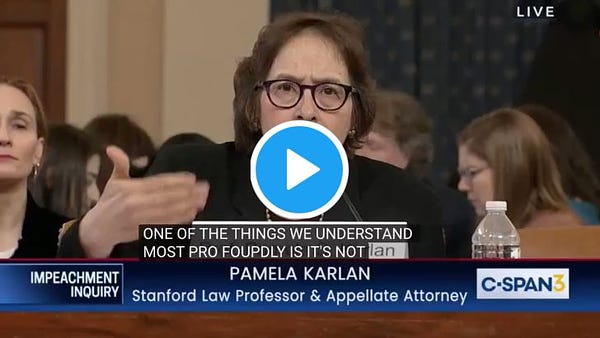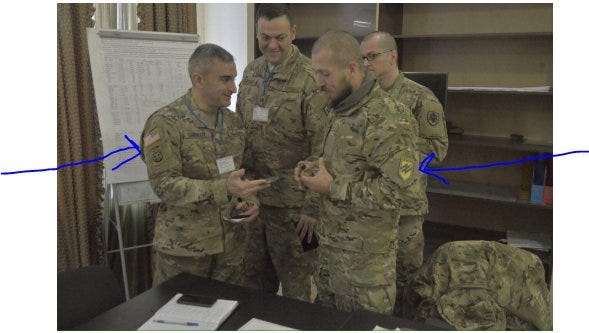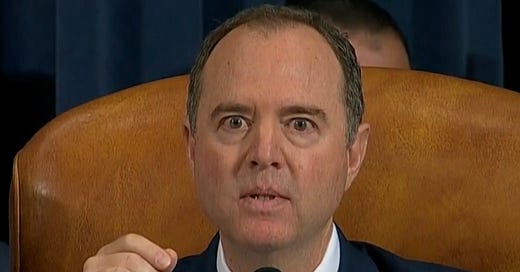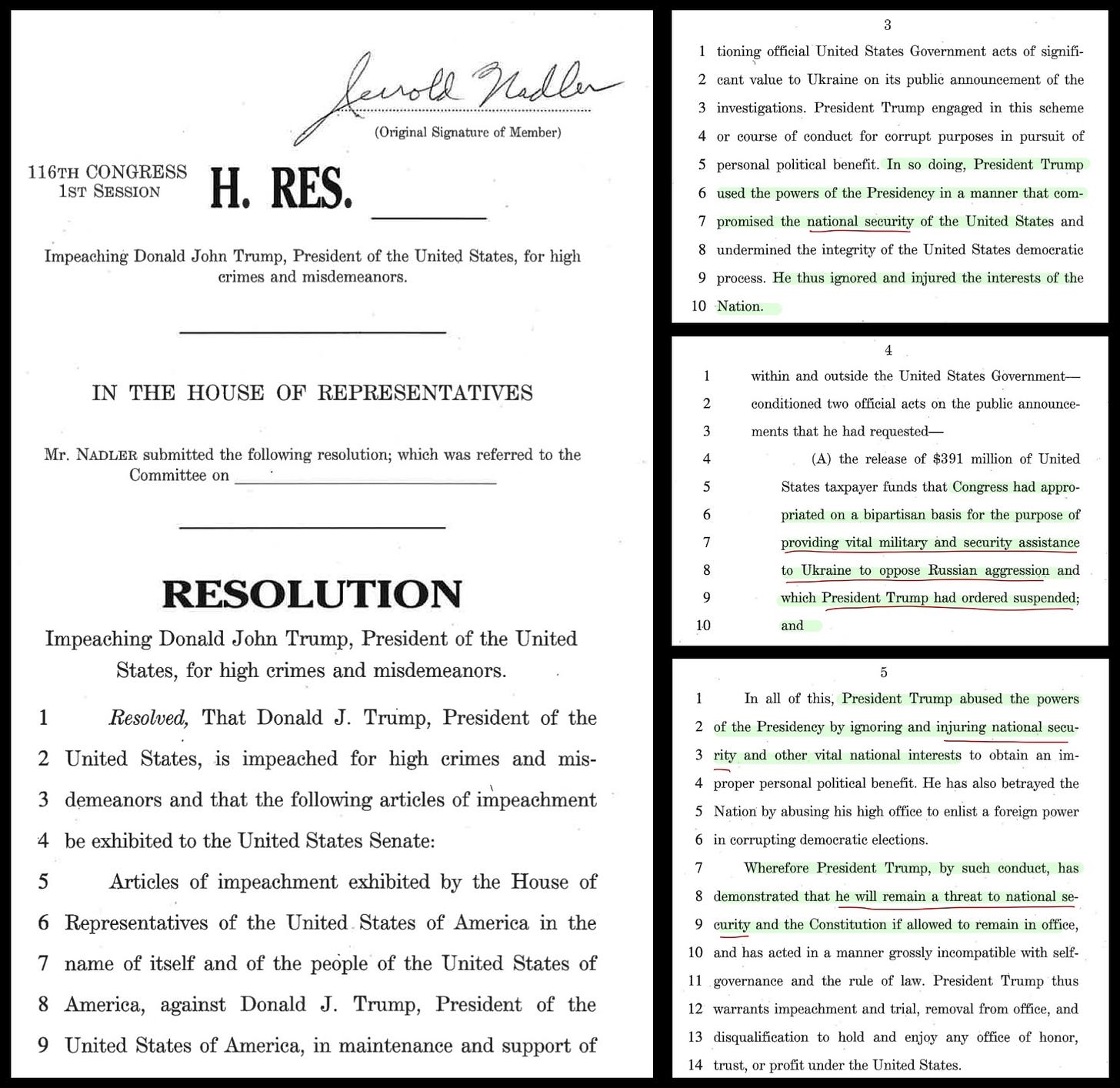Trump's Impeachment, Ukraine, and War With Russia
Let me get all official and DC-like and call it the “Ukraine Doctrine.”
I’ve been trying to stay away from this spy-fed impeachment show as much as possible, but it has been useful. It has helped bring to light the existence of something that’s now taken as gospel by much of America’s political, military, and foreign policy establishment, but which had never been spelled out so clearly and so publicly and so consistently before. Let me get all official and DC-like and call it the “Ukraine Doctrine.”
It’s the idea that Ukraine is a forward operating base in America’s war with Russia — a strategic military barrier that’s keeping the Russian horde pinned down and preventing it from overrunning the western world. That’s why you constantly hear all this talk about Ukraine being such a “vital” and “strategic” partner and why it requires a constant infusion of weapons. If America doesn’t fight Russia and kill Russians in Ukraine, Russian tanks are going to roll through the Donbass, past Kiev, into Poland, then Germany and France…and then get on a boat and sail all the way to America. And before you know it, Putin is going to be personally at your doorstep, terrorizing you and your family and stealing your Amazon packages.
It’s a ridiculous notion based on a bunch of reheated paranoid Cold War Era thinking. It was an exaggeration then and it’s even more of an exaggeration today. I mean, for a dangerous expansionist power, Russia couldn’t even keep Ukraine from going over to the EU in 2014 and had to grab Crimea, home to its Black Sea navy, by force. That kind of expansionist flex is weak indeed — and that’s in a bordering territory that’s been in Russia’s low orbit culturally, linguistically, and politically for centuries.
But this “Ukraine Doctrine” is about more than just your routine imperial threat inflation. It’s basically an admission that we are in an undeclared war with Russia. Not an ideological “values” war or a soft power propaganda war or a sanctions war, but what think-tankers like to call a “hot” war: a war in which America is fighting Russia on Ukrainian soil with Ukrainian bodies and American weapons, American training, and American financial support.


The argument that “we must fight the Russians there so we don’t have to fight them here” was made time and time again in different ways all throughout the impeachment hearings and the non-stop coverage and commentary that surround them. Diplomats and foreign policy experts called up to testify stated it as a matter of fact. Members of congress talked about it as of it was settled policy. It wasn’t debated or called into question by the Democratic Party, and it wasn’t attacked by the Republican opposition either. As far as I could tell, no one disagreed with the premise that America is at war with Russia — and that Ukraine is the battleground. I also don’t remember it being declared by Congress and signed by any president. But then wars aren’t really declared anymore.
If you read the impeachment literature, including the articles of impeachment, you’ll find the notion that we are at war with Russia underlies a major part of the case against Trump. Aside from the charges of self-dealing and corruption and attempts to influence an election, Trump’s other overarching crime is he “compromised American national security” and “injured national security” by slightly delaying the nearly $400 million in military aid to Ukraine that had been approved by Congress. The argument is that he will “remain a threat to national security” if he remains president and so must be removed. This line of thinking is expressed even more clearly in the House Judiciary Committee report on impeachment.
The articles of impeachment are very much about war with Russia.
The impeachment’s obsessive focus on Russia, Ukraine, and “national security” — whatever that terms means — has been useful because it confirms something that I and other journalists and historians who have studied and reported from Ukraine have known for a long time. The point of America’s recent support for Ukraine has had little to do with “democracy” or “the rule of law” or “anti-corruption” or any of the other tired slogans constantly thrown around to justify imperial interventions. Today, America sees Ukraine as a strategic ally because it can be used as a battering ram against Russia. It’s about destabilization. (Well, destabilization and sleazy money-making, but the money-making goes without saying).
Ukraine can’t defeat Russia no matter how many American military advisers train Ukrainian troops or how many millions the good and totally not corrupt people at Raytheon Inc make selling their Javelins. The point isn’t for Ukraine to win the war. The point is to make Russia bleed — economically and militarily. And it doesn’t matter how many people die or suffer or how much of Ukraine and its economy is laid to waste in the process.
As I’ve written in bits and pieces before on here before, America’s foreign policy establishment — its diplomats, spies, and politicians — have seen Ukraine as a key field of battle against the Soviet Union going back to late 1940s. For decades, Ukraine and its diaspora were considered prime weapons for destabilizing the Soviet Union. It’s why America, Canada, the UK, and other western countries opened their doors to Ukrainian fascists and Nazi collaborators after World War II. Their hardcore ideology and their willingness to die for their lost nationalist cause were seen as important qualities in the fight against communism. Some of the earliest covert armed CIA operations against the Soviet Union involved parachuting Ukrainian Nazi collabo guerrillas behind Soviet lines to sabotage and whip up rebellion among Ukrainian peasants.
And little has changed today.


America still sees Ukraine as a weapon against Russia. And it still needs Ukrainian fascists and ultra-nationalists to do the fighting and the killing. Where else could you find young men eager to get their limbs blown off to go fight the Russians — which mostly involves sniping and lobbing mortars at Ukrainians on the other side of the trench.
The interests of Ukrainian fascists and America’s foreign policy apparatus might again be in full alignment, but this alignment goes against the democratic will of the Ukrainian people.
It’s important to remember that the majority of Ukrainians want peace. The country’s current president — Volodymir Zelensky — was elected earlier this year with the biggest margin in Ukraine’s history: 73% of the vote.




